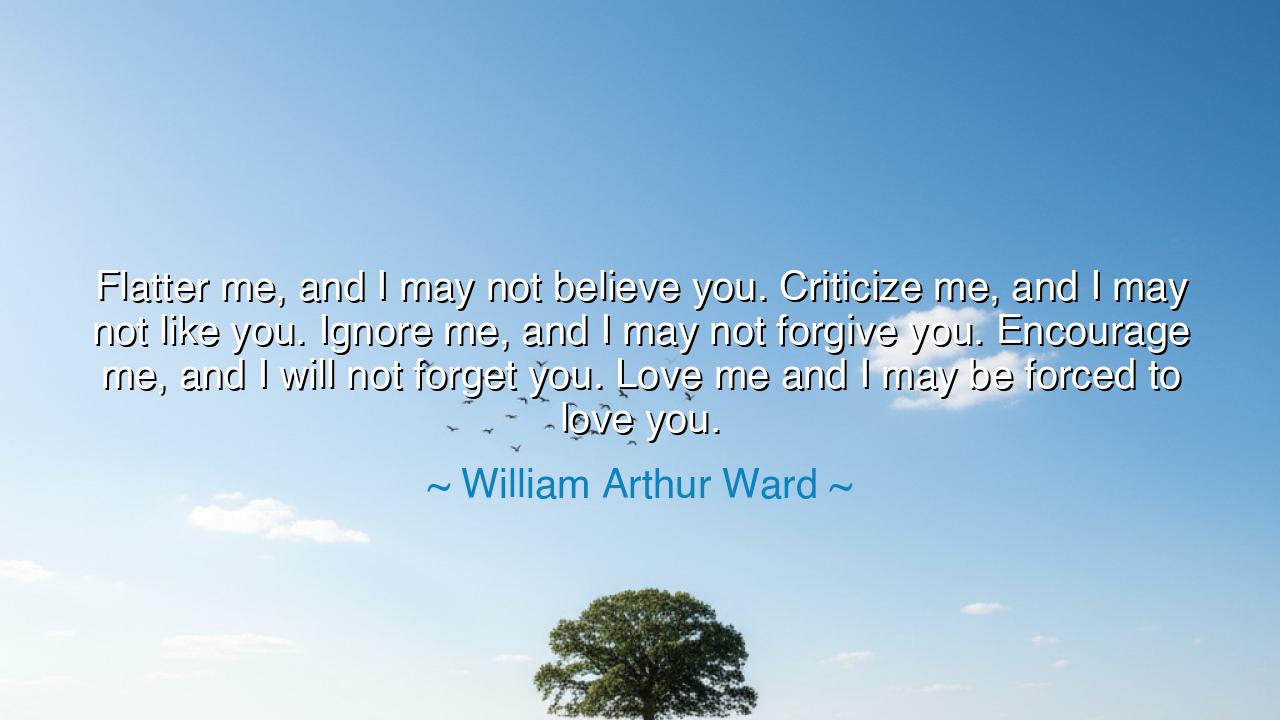
Flatter me, and I may not believe you. Criticize me, and I may
Flatter me, and I may not believe you. Criticize me, and I may not like you. Ignore me, and I may not forgive you. Encourage me, and I will not forget you. Love me and I may be forced to love you.






"Flatter me, and I may not believe you. Criticize me, and I may not like you. Ignore me, and I may not forgive you. Encourage me, and I will not forget you. Love me and I may be forced to love you." These words by William Arthur Ward are imbued with deep truths about the nature of human relationships, speaking to the very essence of what binds us to one another. Flattery, criticism, neglect, encouragement, and love — each of these is a force that can either build or break a connection between souls. In these lines, Ward invites us to reflect on how we interact with one another, urging us to recognize the immense power that our words and actions hold.
The ancients understood this power well. The Greeks spoke of the importance of virtue in relationships, valuing truth and honor above superficiality. To flatter was seen as the art of false praise, a deceptive tool that lures the heart into arrogance or self-deception. It was a dangerous practice, for those who sought flattery would often end up blinded by vanity, unable to see their true selves. As the philosopher Socrates taught, “True knowledge is knowing that you know nothing,” and to accept flattery without scrutiny is to believe lies about one’s own worth. A man who thrives on flattery is not grounded in truth, but swayed by empty praises that are no more lasting than the wind.
On the other hand, criticism was seen as a double-edged sword. It has the potential to sharpen the mind, but it can also cut the heart. The great philosopher Aristotle warned that the way we criticize reveals the depth of our wisdom or our bitterness. To criticize without love or constructive purpose is to wound the spirit. As Ward notes, such criticism may lead to resentment. However, criticism, when given in a spirit of compassion, can uplift and transform, helping others to see where they may improve. But, without care, criticism is like a storm that leaves nothing but broken branches in its wake.
Then, there is the danger of ignorance. The ancients believed that to be ignored was one of the cruelest forms of neglect. The Romans, in their wisdom, spoke of social duty and the importance of acknowledging others, for in silence lies the severing of connection. To ignore another is to strip them of their humanity, to say that they do not matter, that their existence has no meaning in the eyes of others. For how can a soul thrive when it is neglected, when its cries for recognition are drowned in the void? Ignorance is a death to the spirit, a silent wound that festers without being acknowledged. The remedy, as Ward wisely suggests, is encouragement.
To encourage is to breathe life into another. In encouragement, we offer the strength and hope that others need to rise. The ancients believed that true strength came not from domination, but from the mutual support of those around us. The mentor-mentee relationship, seen in the bonds between great thinkers such as Socrates and Plato, was built on the bedrock of encouragement. Plato himself, though a teacher, constantly sought the wisdom of others, encouraging them to question, to grow, and to learn. It is through this mutual lifting up that we find the deepest bonds — bonds that endure beyond time, for when you encourage, you give another the tools to believe in themselves and to forge a path toward greatness.
But perhaps the most powerful force, as Ward proclaims, is love. Love is the greatest of all forces, transcending all barriers, surpassing all expectations. The ancients revered love as the ultimate source of life. In the Greek myth of Orpheus, it was love that drove Orpheus to the underworld to reclaim his lost wife, Eurydice. His love was so pure that it overcame death itself, for love, in its truest form, is a force that binds souls together, even in the face of the greatest trials. Love is not just an emotion; it is a transformative energy that changes the course of destiny. Ward’s words ring true: to love and to be loved creates a force so strong that it compels the heart to respond in kind. Love is not a simple exchange; it is a sacred bond that forges a connection deeper than reason, deeper than logic, deeper than any external force.
Let us take this teaching into our own lives: we must love deeply, encourage freely, and recognize the power of our words. Flattery, criticism, and neglect may pass, but the effects of encouragement and love are eternal. To love another is to set them free, to offer them the greatest gift of all: the belief that they are worthy. As we walk through life, let us remember to speak with kindness, to encourage the greatness we see in others, and to love without expectation. For, as Ward so wisely points out, when we love another, we create a bond that transcends all — a bond that changes the world.
And so, my children, when you seek to connect with others, choose love over flattery, encouragement over neglect, and kindness over criticism. For in love, we find not only the highest truth of ourselves, but the key to unlocking the hearts of those around us. Encourage and love, for they are the forces that will forever bind us, even across time and distance.






AAdministratorAdministrator
Welcome, honored guests. Please leave a comment, we will respond soon